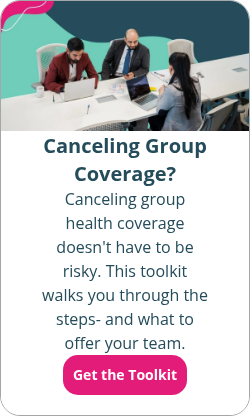How to appeal claim denials and policy cancellations by an insurance company
By Holly Bengfort on May 28, 2025 at 10:30 AM
Health insurance is supposed to be your safety net, covering the bulk of medical bills when the unexpected happens. However, the process isn't always straightforward. Health insurers can deny claims or cancel policies, leaving consumers feeling powerless.
Facing claim denials or policy cancellations, whether from misunderstood policies, miscommunication, or simple oversight, can be an overwhelming experience. Where do you start?
In this article, we'll explain how to appeal an insurance denial or policy cancellation successfully.
In this blog post, you'll learn:
- The two methods for appealing a health insurance denial.
- The key steps to challenge claim decisions and protect your coverage.
- How long it takes to review a claim.
Health insurance claim denials and policy cancellations
If your health insurer refuses to pay a claim or ends your health plan coverage, you can appeal the insurance provider's decision. A KFF analysis1 revealed that individual health insurers on HealthCare.gov denied nearly one in five in-network claims in 2023. Yet, less than 1% of consumers appealed their denied claims.
Common reasons why health insurers deny claims:
- Administrative errors.
- Missing information in the submitted paperwork.
- Concerns regarding medical necessity.
- Your health insurance plan doesn’t cover the service.
- Issues with your provider network.
Health insurance companies can cancel coverage2 if:
- You intentionally put false or incomplete information on your insurance application (known as rescission).
- You don't pay your health insurance premiums on time.
Health insurance appeals process
Health insurers are required to explain why they denied your claim or ended your coverage. They also need to explain how you can dispute their decisions.
You can challenge an insurance company's decision in two ways:
- Internal appeal process: If your insurer denies your claim or cancels your health insurance coverage, you can ask for an internal appeal. This involves your health insurer conducting a full and fair review of its decision. You can ask for an expedited appeal if your case is urgent.
- External review process: You can take your appeal to an independent third party, known as an external review3. An external review ensures your insurance company won't have the final say over whether to pay your claim.
Steps in the appeals process
There's a reason most consumers don't bother with the appeals process. Appealing claim denials and policy cancellations is no simple task. By following a structured approach, you can improve your chances of a successful appeal.
Here are 10 key steps to consider:
- Review the denial or cancellation letter. Carefully read the letter from the insurance company to understand the reasons for the denial or cancellation.
- Gather your policy documents. Review your health insurance policy’s coverage details. Check if the denial or cancellation aligns with the terms outlined in the policy.
- Identify the disputed issues. Pinpoint the exact issues causing the denial or cancellation. Determine if there were any errors or misunderstandings.
- Collect supporting documentation. Gather all relevant documents, such as a letter of medical necessity (LMN), bills, or any other evidence that supports your case.
- Request clarification. If any part of the denial or cancellation is unclear, contact your insurance company for clarification.
- Review legal requirements and protections. Know your health insurance rights. Familiarize yourself with any state-specific insurance laws or consumer protections that may apply to your situation.
- Draft a formal appeal letter. Address the letter to the appropriate department or contact identified in the denial or cancellation notice. Clearly state your disagreement with the insurance provider’s decision, referencing specific policy terms and conditions.
- Include all necessary documentation. Attach copies of all supporting documents and list them in the appeal letter.
- Submit the appeal within the deadlines. Once a health insurer denies your claim, you have up to 180 days to file your internal appeal.
- Track progress. After sending the appeal, confirm the insurance company received it. Maintain communication with the insurer to keep track of your appeal’s progress. Document all interactions, including dates, times, and names of the representatives you speak to.
Data collected by KFF shows insurers usually uphold their original decisions. If your appeal is denied again, consider seeking assistance from an insurance lawyer or a consumer advocacy group. Your state may also have a Consumer Assistance Program4. Your state may also have insurance regulators or consumer protection offices that can assist you.
How long does the review take?
The duration of a review varies based on the specific appeals process5.
|
Appeal process |
Duration |
|
Internal appeal |
Health insurers must resolve a pre-service claim within 30 days and a post-service claim within 60 days. |
|
External review |
No later than 60 days after they receive your request. |
|
Expedited external review |
At least within four business days after they receive your request. |
Want to appeal something else?
You can also challenge Health Insurance Marketplace decisions6, such as being deemed ineligible to enroll in a Marketplace plan or not qualifying for premium tax credits.
Conclusion
Understanding the appeals process and knowing your rights are crucial in dealing with health insurance claim denials and policy cancellations. With persistence and proper knowledge, you can challenge these decisions and potentially reinstate your coverage or receive the insurance reimbursement you deserve.
This blog article was originally published on July 23, 2010. It was last updated on May 28, 2025.
Check out more resources
See these related articles

Tax exclusion vs. tax deduction vs. tax credit
Understand the differences between tax exclusions, deductions, and credits. Learn how each impacts your taxable income and potential savings.

Health insurance options for the self-employed
This article breaks down the various health insurance plans and options for the self-employed so you can make the best decision for your health and finances.

A state-by-state guide to extended open enrollment periods
Did your state extend the annual open enrollment period? Find out in this comprehensive guide detailing the extended open enrollment periods across all states.



